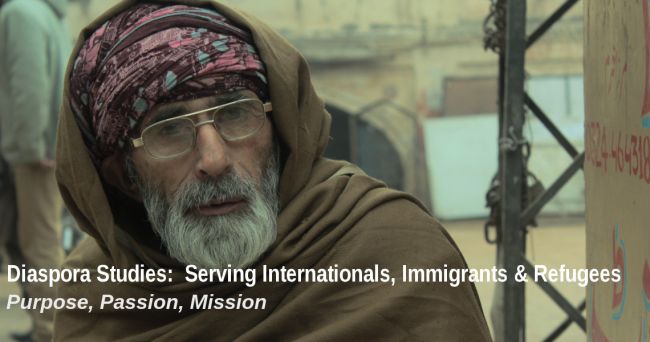DEPARTMENT OF DIASPORA STUDIES
Explore Diaspora Studies
Academic Programs
Dual Enrollment Academies
Certificate Programs
Associate Certificate programs
Undergraduate Certificate programs
Degree Programs
Associate Degrees
Bachelor Completion Degrees
- Major in Diaspora Studies
- Major in Immigration Legal & Interpreting Services
- Major in Immigration Legal Services
- Major in TESOL & Linguistics
Bachelor 2+2 Degrees
Masters Degrees
Doctoral Degrees
Course Descriptions
Undergraduate Courses
Graduate Courses
Resources
Contact
- Still Have Questions?
- Contact Admissions
Calendar

Welcome
The Department of Diaspora Studies combines an understanding of migration studies, immigration law, and specialized services with missional ministry to prepare graduates to meet needs of immigrants, refugees and internationals.
Why Diaspora Studies?
Transnational migration is becoming a day to day phenomenon across cultures. According to data from Migration Policy Institute (2016), the net migration to the United States between 2010 and 2015 was about 5 million. Recent events in Western Asia and Europe illustrate the plight of millions of displaced people.
Diaspora studies enables students to examine both natural and man-made causes of population migration at various levels. It also examines processes as well as challenges people face as they try to adjust to the new destinations. Knowledge of diverse nature of population movements together with intercultural skills in engaging internationals, immigrants and refugees opens doors for missional and career opportunities.
Why Missional University?
Diaspora studies at Missional University are based on the six core values of the University:
Biblically Based:
Diaspora Studies are based on biblical principles of accepting strangers such as Leviticus 19:34:
The foreigner residing among you must be treated as your native-born. Love them as yourself, for you were foreigners in Egypt. I am the LORD your God. (NIV)
Our desire is to reach internationals, immigrants, and refugees with the gospel of Jesus Christ.
Missionally Driven:
The missio dei [mission of God] informs and is the background of Diaspora Studies. So, the courses examine how to go where God is already working in the community. The programs focus on incarnational, missional approaches to engage internationals, immigrants & refugeees for the purpose of individual and community transformation.
Interculturally Focused:
Diaspora Studies use cross-cultural and multinational approaches to examine forms, causes, and consequences of transnational population movements. By definition and essence, intercultural interactions are both diverse and cross-cultural in nature. Students actively and knowingly engage with diaspora populations recognizing that they will probably be taken out of their own cultural comfort zone.
Contextually Informed:
Diaspora Studies address population movements in the contexts of different nationals, race, culture, and socioeconomic backgrounds. The programs require a multi-faceted approach utilizing demographics, social science research methodology, biblical and theological truths as well as case studies and practiced strategies which are all applied contextually to a given context.
Practically Minded:
Diaspora Studies offers insights and techniques that teach students how to apply their knowledge into practice and serve migrant people from diverse socio-economic and cultural backgrounds.
Experientially Transformed:
Diaspora Studies extensively use case studies of the experiences of immigrants. Learners will have opportunities to meet and listen to the stories and lived-experiences of immigrants. They will also use diverse academic media, including documentary films and videos and exercises to inspire missional leadership. Students will gain hands-on experience through an internship and capstone course.
